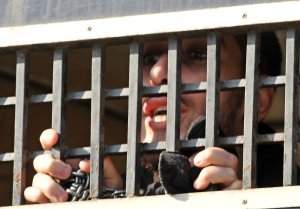Major trauma and worldwide geopolitical turmoil, 9/11 was also the beginning of a downward spiral in rights and freedoms. Many countries, including the democratic ones, starting with the United States and the United Kingdom immediately reacted to the attacks in New York by adopting special laws that roundly ignored human freedoms. On the pretext of the fight against terrorism, these laws made it legal to detain non-nationals, for an undetermined period of time, and on no specific charges, merely on the suspicion that they participated in a terrorist activity or might have had some connection with a terrorist organisation. Many authoritarian states adopted similar laws that they also used to legitimate repression of government opponents and human rights defenders and to criminalise all forms of social protest.
The fight against terrorism also served as a pretext for practices that were completely prohibited and condemned, e.g. the “legalised” use of torture in detention centres such as the American-controlled Guantanamo and Abou Ghraïb centres, or in many other national detention centres, kept secret to escape the law. In some cases, governments decided on targeted, extrajudicial assassinations. According to Patrick Baudouin, FIDH Honorary President, “propaganda that legitimated violations of the right to freedom, on the pretext of fighting terrorism and conveyed through a reflex of well-stoked and manipulated fear, led to the gradual abandonment of the essential values of humanity”.
Ten years later, this liberticidal policy has reaped no benefits and has had devastating effects. With the election of Barack Obama the public discourse underwent a welcomed change. But we see that the promise to close the Guantanamo prison has not been kept. And the war is still raging in Afghanistan, and the alliance between the Talibans and various terrorist movements seems to be gaining ground. Looking beyond the combat against Al Qaeda by the U.S. and its allies, there are other countries that invoke the fight against terrorism to continue enjoying impunity for actions like those carried out by the Russian authorities in the North Caucasus. The rest of Asia is not being spared, e.g. China’s repression of its minority groups in Tibet, and in Xinjiang against the Uighur people.
In the name of the fight against terrorism, many dictators have enjoyed the unconditional, continued support from the western countries they needed to stay in power. The revolutions in the Arab world that started at the beginning of 2011 seem to have woken up many of the western governments to the fact that supporting the people’s aspirations to conquer freedom and rights contributes more to the stability of international order than maintaining authoritarian regimes on seat. This change of attitude is still in the tottering stage, still constrained by various economic and geostrategic interests and by the scepticism and feeling of alarm generated by these accelerated upheavals.
In this situation, FIDH calls for the abrogation of all liberticidal legislation adopted or reinforced after 11 September on the pretext of the fight against terrorism. FIDH also calls upon the states to give greater consideration to human rights in their fight against terrorism.
FURTHER READING:
The 9/11 Decade and the Decline of U.S. Democracy (by the Center of Constitutional Rights)
Africa – Antiterrorism and human rights
Asia – Antiterrorism and human rights
MENA – Antiterrorism and human rights
Latin America – Antiterrorism and human rights
Eastern Europe and Central Asia – Antiterrorism and human rights
Counter-Terrorism Measures and Human Rights, Keys for Compatibility (2005)
SOURCE: FIDH


